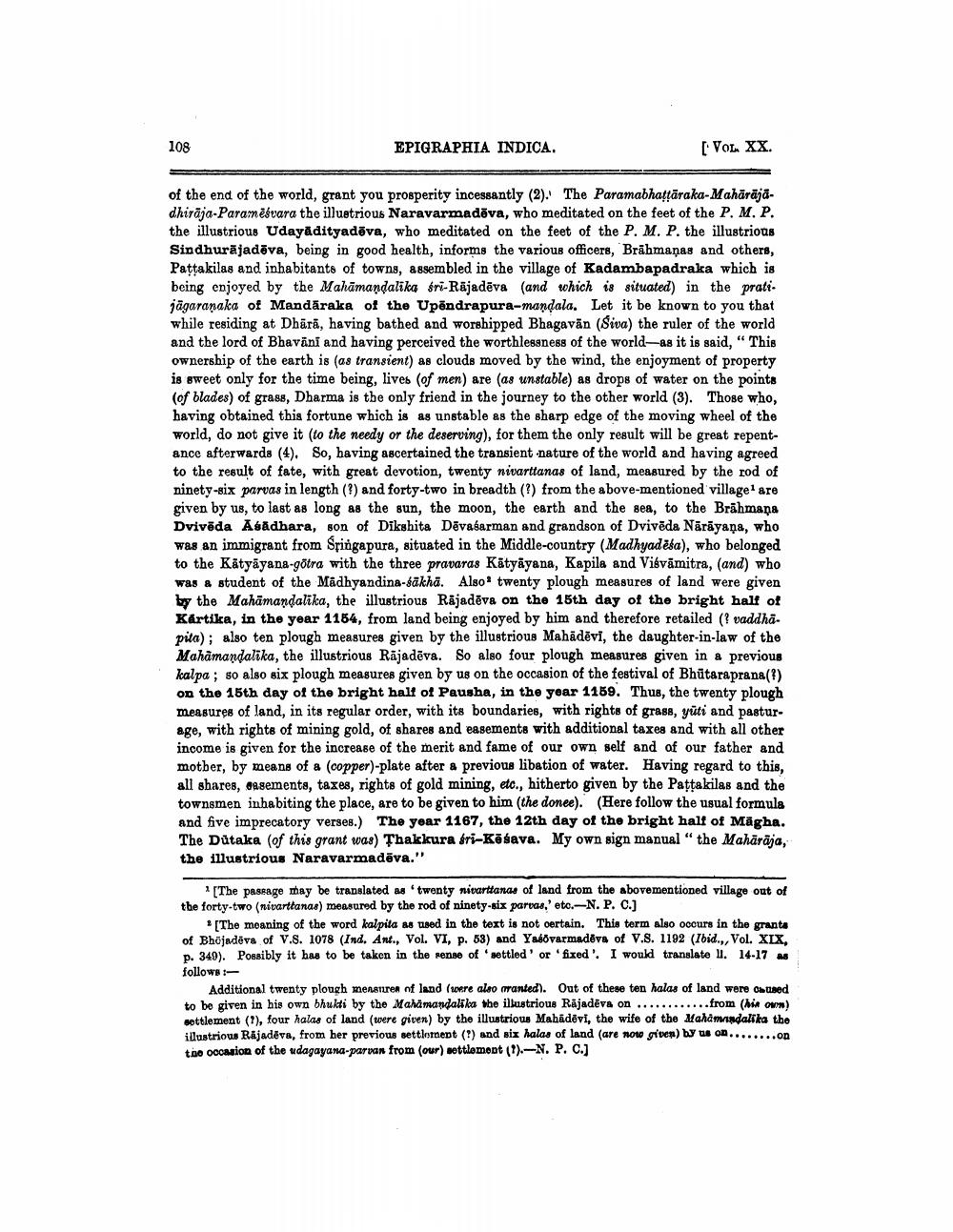________________
108
EPIGRAPHIA INDICA.
[VOL. XX.
of the end of the world, grant you prosperity incessantly (2). The Paramabhattāraka-Mahārāja. dhirāja-Parameswara the illustrious Naravarmadēva, who meditated on the feet of the P. M. P. the illustrious Udayādityadēva, who meditated on the feet of the P. M. P. the illustrious Sindhurājadēva, being in good health, informs the various officers, Brāhmaṇas and others, Pattakilas and inhabitants of towng, assembled in the village of Kadambapadraka which is being enjoyed by the Mahāmandalika sri-Rājadēva (and which is situated) in the prati. jāgaranaka of Mandāraka of the Upandrapura-mandala. Let it be known to you that while residing at Dhārā, having bathed and worshipped Bhagavān (Siva) the ruler of the world and the lord of Bhavani and having perceived the worthlessness of the world—as it is said, " This ownership of the earth is (as transient) as clouds moved by the wind, the enjoyment of property is sweet only for the time being, lives (of men) are (as unstable) as drops of water on the points (of blades) of grass, Dharma is the only friend in the journey to the other world (3). Those who, having obtained this fortune which is as unstable as the sharp edge of the moving wheel of the world, do not give it (to the needy or the deserving), for them the only result will be great repentance afterwards (4). So, having ascertained the transient nature of the world and having agreed to the result of fate, with great devotion, twenty nivarttanas of land, measured by the cod of ninety-six parvas in length (?) and forty-two in breadth (?) from the above-mentioned village are given by us, to last as long as the sun, the moon, the earth and the sea, to the Brāhmaṇa Dvivēda Asādhara, son of Dikshita Dēvašarman and grandson of Dvivēda Nārāyaṇa, who was an immigrant from Singapura, situated in the Middle-country (Madhyadēša), who belonged to the Kātyāyana-götra with the three pravaras Kätyāyana, Kapila and Visvāmitra, (and) who was a student of the Madhyandina-sakha. Also twenty plough measures of land were given by the Mahamandalika, the illustrious Rajadēva on the 15th day of the bright hall of Kartika, in the year 1154, from land being enjoyed by him and therefore retailed (? vaddha. pita); also ten plough measures given by the illustrious Mahādēvi, the daughter-in-law of the Mahamandalika, the illustrious Rājadēva. So also four plough measures given in a previous kalpa ; so also six plough measures given by us on the occasion of the festival of Bhūtaraprana(?) on the 15th day of the bright half of Pausha, in the year 1159. Thus, the twenty plough measures of land, in its regular order, with its boundaries, with rights of grass, yüti and pasturage, with rights of mining gold, of shares and easements with additional taxes and with all other income is given for the increase of the merit and fame of our own self and of our father and motber, by means of a (copper)-plate after a previous libation of water. Having regard to this, all shares, basements, taxes, rights of gold mining, etc., hitherto given by the Pattakilas and the townsmen inhabiting the place, are to be given to him (the donee). (Here follow the usual formula and five imprecatory verses.) The year 1167, the 12th day of the bright half of Māgha. The Dutaka (of this grant was) Thakkura sri-Kēšava. My own sign manual "the Mahārāja, the illustrious Naravarmadëva."
*[The passage may be translated as 'twenty nivarttanas of land from the abovementioned village out of the forty-two (nivarttanas) measured by the rod of ninety-six parvan, eto.-N. P. C.)
* The meaning of the word kalpita as used in the text is not oertain. This term also occurs in the granta of Bhājadēva of V.S. 1078 (Ind. Ant., Vol. VI, p. 53) and Yaéðvarmadēva of V.8. 1192 (Ibid.,, Vol. XIX, p. 340). Possibly it has to be taken in the rense of settled ' or 'fixed'. I would translate II. 14-17 ms follows:
Additional twenty plough menenren of land were also manted). Out of these ten halas of land were Otised to be given in his own bhukti by the Mahamandalika the illustrious Rajadēva on ............from (hin own) settlement (1), four halas of land (were given) by the illustrious Mahadevi, the wife of the Mahamundalika the illustrious Rajadēva, from her previous settlement (!) and six halas of land are not given) by us on........on the occasion of the udagayana-parnan from (our) settlemont (1).- N. P. C.)




